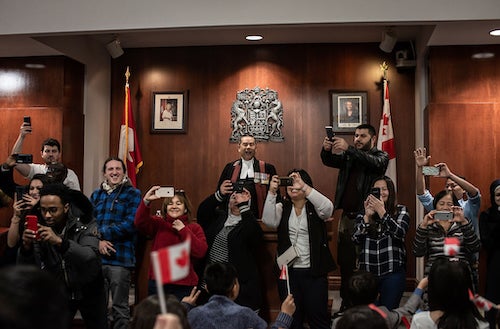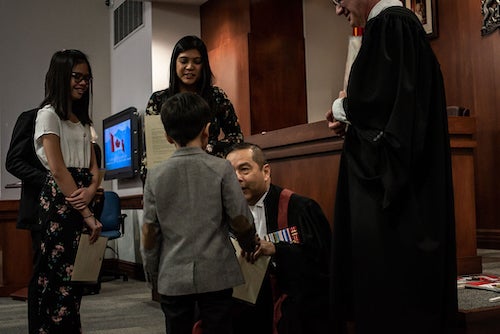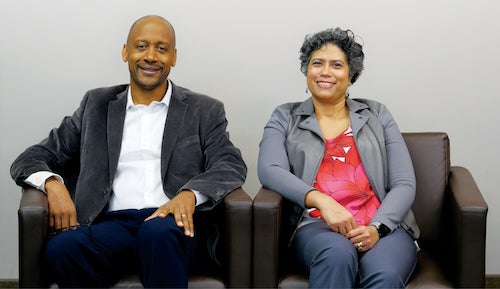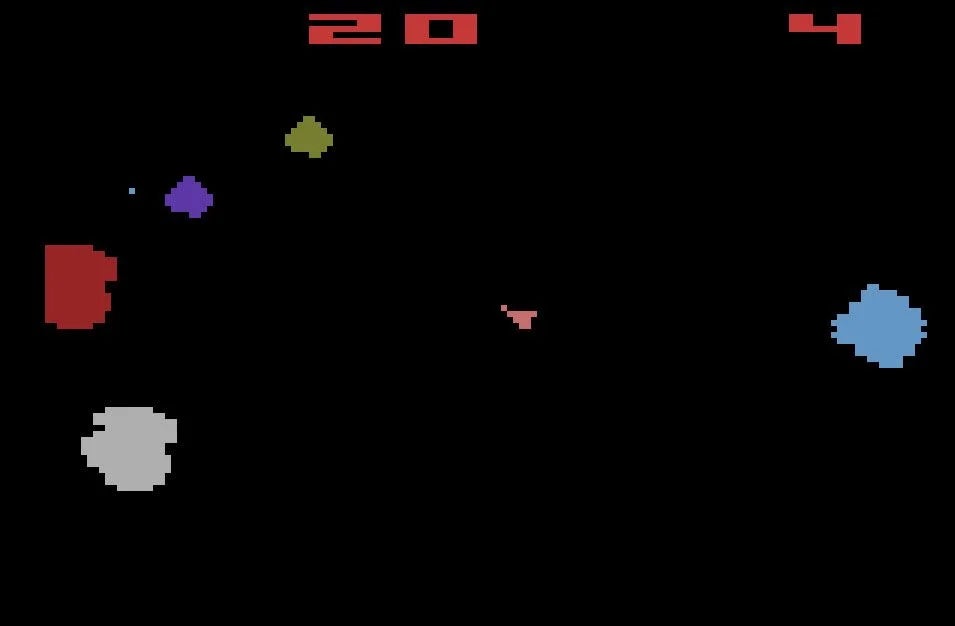Editor:
Brandon Sweet
University Communications
bulletin@uwaterloo.ca
Welcoming 100,000 newcomers to Canada

by Beth Gallagher. This is an excerpt of an article originally featured in the Spring issue of Waterloo Magazine.
It’s not every day you see a judge in black ceremonial robes, crouching down to speak to a four-year-old girl. Judges are usually seated behind an imposing desk on an elevated platform.
But this is a citizenship ceremony and this judge is Albert Wong (BSc ’80), who remembers well what it feels like to be a child, and to leave behind everything you know, to start a new home in Canada.
“I recognize that many of the children are too young to understand the significance of the moment,” Wong says, who has sworn in more than 100,000 new Canadians since he was appointed a citizenship judge in 2014. “But I hope to make an impression on them so that when they look back on those first moments of becoming a Canadian, they remember feeling valued, respected and the sense of belonging.”

Judge Albert Wong (BSc ’80) greets a child at a citizenship ceremony.
Wong does something unique at the end of each ceremony. He asks everyone at the ceremony to give a loud, joyful cheer. “I want to recognize that this is a joyful day for the newcomers, but it is also a joyful day for Canada,” Wong says. “And I want to acknowledge that when we are joyful, we are showing that we belong here.”
When a campus community becomes a Canadian home

Lannois and Anandi Carroll-Woolery.
by Megan Vander Woude. This is an excerpt of an article originally published in the Spring issue of Waterloo Magazine.
When Lannois Carroll-Woolery (BASc ’97) left Jamaica to come to the University of Waterloo, he spent his first year making friends in the Association of Caribbean Students – bonding over soccer, dominoes and calypso music.
A year later, Anandi Carroll-Woolery (BMath ’02) came to Waterloo from Trinidad and joined the same student group. She still remembers the first time she met Lannois: “I saw him from across the Student Life Centre. He was playing dominoes.”
Lannois and Anandi got married while they were still in school and moved into a residence for married students — an apartment complex across from campus, now called University of Waterloo Place, where they started a family and built their home.
Families from Peru to India to Iran
“In the residence, we were introduced to other parents with small children, and we had quite a bit in common,” says Lannois, now a staff member at the University. “It just seemed that most of the families in the nine apartments were international students. So, we made friends from Peru, Grenada, Brazil, India, Iran – all over the world.”
At first, their neighbours seemed very different. But over time, those differences faded – they would see each other in the laundry room, on family walks in Waterloo Park or picking up their kids from school. Then, they started playing soccer together.
“Soccer really is an international game,” says Lannois. “When you’re playing soccer, language barriers go away because you all know the rules.”
Lannois and Anandi spent seven years in residence while they finished their degrees and raised their children. “It was wonderful,” says Anandi. “I took some time away from school to be a mother, and there were other stay-at-home parents in the apartments. Some of the other mothers were also in school or had degrees, and it was a real blessing to be with like-minded people – where education was very important, family was important and culture was important.”
Scholarships for volunteers in African, Caribbean and Black communities
Today, they still call Waterloo home. They’re active members of the Caribbean Canadian Association of Waterloo Region and generous donors to University of Waterloo students. When their fellow alumnus Michael Robson (BA ’13) created the Collective Movement Award, Lannois and Anandi were some of the first donors to contribute. The award recognizes students who volunteer with African, Caribbean and Black communities, and who build a compassionate culture at Waterloo.
“When Michael told us how the Association of Caribbean, African and Black Students helped him create a home away from home, and how he wanted to pay it forward, we knew we wanted to contribute,” says Lannois. “We were happy and excited members of the same community when we were students. It was an easy ‘yes’ to support the positive social fabric that we experienced at the University.”
Read the rest of the article on Waterloo Magazine.
Ask an online learning expert: How can I create community in my online course?

by Daniel Opperwall. This article is part of a series from the Centre for Extended Learning.
Human beings learn best when we learn in a community. One of the big challenges facing new online and remote instructors is the question of how to create a sense of connection between themselves and their students online. Yet, just a small number of key principles can have a huge positive impact.
Modern online education theory emphasizes the importance of building a sense of presence in your course in order to build community. There are a few different types of presence, but two are most essential for building community online: teaching presence and social presence. Teaching presence occurs when students experience their instructor(s) as being active in the life of the course, available when support is needed, and invested in student success and wellbeing. Social presence occurs when students feel able to communicate easily and effectively with their instructor and each other, feel that others around them are also invested in learning, and feel cared-for and valued as unique human beings.
But how can we be present to each other in these ways when we are separated in space? Real and deep presence is absolutely possible in online and remote courses when we take steps to cultivate it. As you can imagine, there are countless resources that can help you in this work (including Waterloo’s own recent contribution: Fostering Engagement: Facilitating Online Courses in Higher Education). Three key principles stand out:
- Communicatewith students frequently. Use lots of announcements—one a week at minimum. Connect what you say to things happening in the course or in the world this week. Be prompt when responding to student e-mails and questions, and make sure students know when and how quickly to expect an answer. Do your marking as quickly as you can. Offer help to students who seem to be falling behind.
- Encourage student interaction. From well-crafted discussion forums, to group projects, to peer-review and video assignments, be sure that your students are hearing one another’s voices. Consider using ice-breakers, or social discussions to encourage people to share their personalities. Encourage students to help each other work through and discuss course material. There are always real humans behind the screens—help them to connect.
- Be yourself and model presence in the course. Find ways to let your personality shine through and share your own experiences. Create spaces for some social conversation the way you probably do in the few minutes before or after a classroom meeting. Humanizing yourself in the online classroom gives students a lead to follow, and helps them to feel connected with you and each other throughout term.
These ideas can be put into practice no matter how you have designed your course, or how you are delivering content and assignments. Whatever tools you have chosen, focus on leveraging them to build teaching and social presence in your online or remote course, and you will be well on the way to a healthy online or remote course community.
What's open and closed on Canada Day and other notes

Tomorrow is Canada Day, a statutory holiday that this year comes smack dab in the middle of the week.
Campus operations will be even more limited than usual on July 1:
- The Student Life Centre and the Turnkey Desk will be closed on Wednesday, July 1;
- Food Services locations have been closed since May 3;
- W Store will begin processing online orders placed on Canada Day on Thursday, July 2.
However, Library Virtual Reference Hours (email and live chat) will run from 12 noon to 6:00 p.m. on Wednesday, July 1.
As always, the university police (519-888-4911) will be on the job, as will the central plant staff, who will be monitoring campus buildings. For maintenance emergencies, call ext. 33793.
Plant Operations has announced that Ring Road will be closed due to water main repair work that will take place on Thursday, July 9. Ring Road will be closed at the entrance to the University Club's parking lot. Emergency services and Grand River Transit have been informed.
The Daily Bulletin will return on Thursday, July 2. Have a great holiday tomorrow!
Link of the day

When and Where to get support
Students can visit the Student Success Office online for supports including academic development, international student resources, leadership development, exchange and study abroad, and opportunities to get involved.
Instructors can visit the Keep Learning website to get support on adapting their teaching and learning plans for an online environment. The following workshops are current offerings from the KL team (CTE, CEL, ITMS, LIB):
Teaching Online: Basic Skills for TAs, June 1 to 30.
Teaching Online: Advanced Skills for TAs, June 1 to 30.
Navigating Academic Integrity Issues in Online Teaching and Learning, Tuesday, June 30, 10:00 a.m.
Introduction to OER Courses,Tuesday, July 7, 10:00 to 10:30 a.m.
Remote Course Design Essentials, Wednesday, July 8.
Introduction to Best OER’s in STEM, Thursday, July 9, 2:30 to 3:00 p.m.
Employees can access resources to help them work remotely, including managing University records and privacy of personal information
Interested in learning more about engaging your students in an online course? The Centre for Extended Learning has created a new resource for you called "Fostering Engagement: Facilitating Online Courses in Higher Education"
ThisOpen Educational Resource was designed for post-secondary instructors and teaching assistants who would like to better understand the critical role of facilitation in online course delivery, and build practical skills and strategies that are relevant, effective, and authentic.
Here are some tips for staying healthy while working from home.
The Writing and Communication Centre has gone virtual. We have many online services to help you meet your goals, including: Virtual Pre-booked and Drop-in appointments, Online workshops, Virtual Grad and Faculty Writing Cafés, Instagram Live Q&A sessions, Live PJ-Friendly Write-ins, Online learning resources, and Online programming for Master’s and PhD students. Whatever you’re working on, we’re here to help! Visit our website for more information.
We understand that these circumstances can be troubling, and you may need to speak with someone for emotional support. Good2Talk is a post-secondary student helpline based in Ontario, Canada that is available to all students.
If you feel overwhelmed or anxious and need to talk to somebody, please contact the University’s Campus Wellness services, either Health Services or Counselling Services.
The Library has published a resource guide on how to avoid information overload.
The Faculty Association of the University of Waterloo (FAUW) continues to advocate for its members. Check out the FAUW blog for more information.
The University of Waterloo Staff Association (UWSA) continues to advocate for its members. Check out the UWSA blog for more information.
WUSA supports for students:
Food Support Service food hampers are currently available from the Turnkey Desk on weekdays from 9:00 a.m. to 4:00 p.m. in the Student Life Centre. If you have any questions please email us at foodsupport@wusa.ca.
MATES – Providing general online Peer Support via Skype to undergraduate students. To set up an appointment, please go to: https://wusa.ca/peersupport
Glow Centre - Providing online Peer Support for the LGBTQ2+ community via Skype to Undergraduate students. To set up an appointment, please go to: https://wusa.ca/peersupport
The Women’s Centre– Providing online Peer Support via Skype to undergraduate students. To set up an appointment, please go to: https://wusa.ca/peersupport
RAISE– Providing online Peer Support via Google to undergraduate students. To set up an appointment, please go to: https://wusa.ca/peersupport
The Bike Centre – Now open by appointment for your bicycle repair and rental needs in the Student Life Centre. For more information or to schedule an appointment, please go to: https://wusa.ca/bikecentre
Centre for Academic Policy Support - CAPS is here to assist Waterloo undergraduates throughout their experience in navigating academic policy in the instances of filing petitions, grievances and appeals. Please contact them at caps@wusa.ca . More information at http://wusa.ca/caps
WUSA Commissioners who can help in a variety of areas that students may be experiencing during this time:
- Equity – equity@wusa.ca
- Co-op and Experiential Affairs – coop.affairs@wusa.ca
WUSA Student Legal Protection Program- Seeking legal counsel can be intimidating, especially if it’s your first time facing a legal issue. The legal assistance helpline provides quick access to legal advice in any area of law, including criminal. Just call 1-833-202-4571.
Empower Me is a confidential mental health and wellness service that connects students with qualified counsellors 24/7. They can be reached at 1-844-741-6389.
When and Where (but mostly when)
Warriors Coaching Clinics. Every Wednesday from June 3 to July 15. Free online sessions highlighting a wide range of topics featuring Warriors Coaches and staff. Register in advance for the zoom link.
Warriors Jump Into June Challenge. Weekly challenges from June 8 to July 4 (Movement, Sleep, Water and Nutrition). Post your photo for a chance to win a $100 box from truLOCAL each week. Stay healthy Warriors!
Healthy Warriors at Home. Free programming including Online Fitness, Personal Training, Health Webinars, Personalized Nutrition and more. Open to students, staff, faculty and alumni. Register today.
Waterloo Warriors Online Camps. Online youth experiences including basketball, hockey and multi-sport camps for a variety of ages. Starting at $48.00/week. Register today.
International Live Chat #2 – Adjusting to a New Culture, Tuesday, June 30, 9:00 to 10:00 a.m.
Navigating Academic Integrity Issues in Online Teaching and Learning, Tuesday, June 30, 10:00 to 11:30 a.m.
Canada Day holiday, most University operations closed, Wednesday, July 1.
Grammar studio I: The most common grammar trouble spots, Thursday, July 2, 2:00 p.m. Live Q & A on LEARN.
University of Waterloo internal communications survey deadline, Friday, July 3.
Design & deliver I: Structure and delivery, Monday, July 6, 10:00 am, Live Q & A on LEARN.
HREI201: Cultivating Consent Culture from an Intersectional Lens, Monday, July 6, 1:30 p.m. to 3:00 p.m.
International Live Chat #3 – Thriving in First Year, Tuesday, July 7, 9:00 to 10:00 a.m.
NEW - Leadership, Intersectionality, and Advancing in the Academy, Wednesday, July 8, 10:00 a.m to 11:30 a.m.
Science Live Chat, Wednesday, July 8, 11:00 a.m. to 12:00 p.m.
Intro Session: Billion Dollar Briefing, Wednesday, July 8, 6:30 p.m.
Grammar studio II: Sentence structure and punctuation, Thursday, July 9, 2:00 pm, Live Q & A on LEARN.
Engineering Live Chat, Thursday, July 9, 3:30 to 4:30 p.m.
NEW - Ask Us Anything: Indigenous Initiatives, Friday, July 10, 1:00 p.m. to 1:45 p.m.